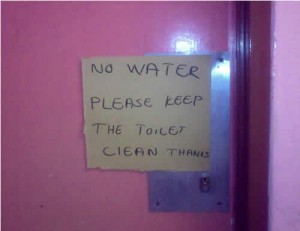The first time I heard about sanctions, back in 2005, I thought it was a lie fabricated by Gono et al to justify his heavy handed printing of currency and the resultant inflation as a necessary evil.
No one can deny that this worked in the favour of those with connections and in high office to profiteer off the situation without regard for the plight of the general mass of Zimbabweans. My resentment was always especially directed at ministers and such who casually drove past me in their government issue air conditioned Benz as I stood in a round-the-block queue waiting to get my money from the bank for the Kombi home.
Later in the evening, they would be on ZBC news, well dressed and rotund, emphatically telling a ragged, sinewy audience just in from their drought-stricken fields that ‘we live in poverty because of sanctions”… some of us more than others.
Last week a newsreader on radio was saying that hospitals and are ill-equipped because of sanctions and let loose a diatribe about the effects of poor health care on Zimbabweans. There was little mention of the facts: diagnostic machinery has fallen into disrepair because the companies that sold it to us cannot or will not honour their service agreements because their home countries either make no effort to encourage trade with Zimbabwe, or at worst actively discourage it. A little while ago Natpharm declared that they had run out of stocks for the Malaria TB programme in the height of the malaria season. Again without reference to the fact that the programme is largely funded by the Global Fund, which is heavily influenced by the US government and has for several years rejected applications by Zimbabwe for funding of this and other programmes because of mismanagement by the government and the effects of ZIDERA.
Much has been made by the government of ZIDERA. But the strategy of speaking the name of its demon possessor fails government again. They do not explain that while the act does makes provision for targeted sanctions against individuals, it also empowers the US to use its voting rights and influence (as the main donor) in multilateral lending agencies, such as the IMF, World Bank, and the African Development Bank to veto any applications by Zimbabwe for finance, credit facilities, loan rescheduling, and international debt cancellation. This basically means that the Government of Zimbabwe is not only broke but it is in massive debt, following not only from the governments own over expenditure, corruption and mismanagement but also from the structural adjustment programmes it was ‘encouraged’ to implement by the IMF and the World Bank in the 1990s.
For the ordinary Zimbabwean this means that the government is unable to carry out it’s essential services. It is unable to bring electricity to rural houses, fix potholes in the roads, supply clinics and hospitals with drugs, build dams or increase the capacity of the water delivery system. This in turn means that we have places in Zimbabwe that saw better times in the stone age, and health crises such as HIV/AIDS, malaria and cholera will always be a rainy season away.
Land reform may have been successful, but there is no way to protect people from random acts of nature. In times of drought, such as this year, sanctions mean that the government cannot buy maize to feed its own population. Even without an act of nature the government is unable to fully support farmers as is the policy in more developed countries.
The anti sanctions propaganda fails to explain how exactly sanctions affect the average person living an ordinary life. Our government in its poor application of propaganda fails to understand that they have educated their population beyond their simplistic reasoning, and the contradictions and omissions in the information they liberally propagate on the state broadcaster are not lost on us. Reading Marko Phiri’s blog on the views of the people in Gwanda, I am not surprised to find that many people understand the sanctions to be merely about travel bans.










